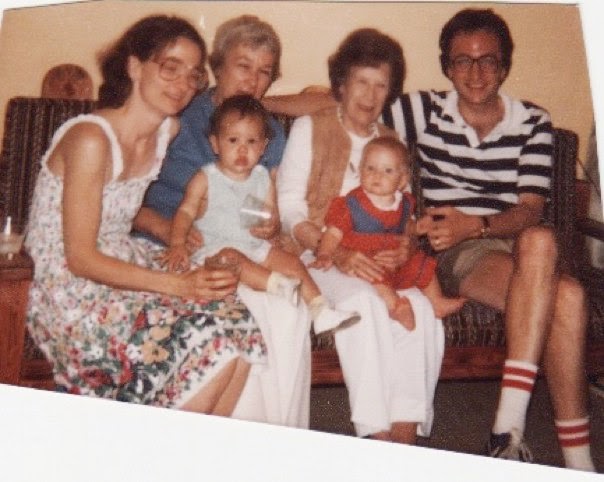 |
| My mother with me. |
In 1994, I read a book called “Motherless Daughters” by Hope Edelman (http://hopeedelman.com), and I gave copies of it to people I knew who were already motherless daughters. I felt confident that it prepared me for the eventual day when I became a motherless daughter. Of course I didn’t expect that to happen for a long time and didn’t know I’d become a fatherless daughter first. At the time, I was the mother of three daughters myself and had a decent relationship with the former “Bitch” now that I understood what she was going through during the years I referred to her so fondly. She was a wonderful and loving, though strict, grandmother.
 |
| My brother and I with our mom, grandmother, and the first grandchildren. |
When my father died in 1998, she already had her first broken hip and within a few years had her second hip surgery. As if my father’s death wasn’t enough, my sister died two years later. Her grief really sucked the wind out of her sails. Then my mother was sidelined by triple by-pass surgery while visiting me, and a few years after that, by pulmonary embolism; and she finally moved into an assisted living home where she died in 2009. I’m not even sure how many times I flew back and forth across the country to do what I could to help. She had so many ups and downs and more than once reached a point where she would have chosen death. In fact, after the pulmonary embolism, she refused treatment and went home under hospice care. I suppose her heart was working too well because she survived, just as she had before.
Every time I left her, I felt like I was saying my final goodbye. Once, as my daughter and I stood at the door to leave and called out our traditional parting words, “See you tomorrow!” she waved weakly and said “In your dreams.”
 |
| My mother with her first-born granddaughters, at the rehab center before going home. |
But she rallied and we had a few more visits. Then five months before she died in the assisted living home (where I had helped move her on one of my visits) I sat in the incredible leather chair my brother had purchased for her and took a nap while she napped. When she woke up, I showed her my web site about her and my father during World War II. I read my dedication page to her, and I cried. She put her hand up and though she could hardly speak, told me to “Stop.” I sat on the edge of the bed and explained that I wouldn’t be able to get back for a visit for a few months — hoping that she’d get my message that I knew this was my final goodbye. I knew she was fading away and was ready to go, but I needed to tell her one more time that I loved her. I sat there for a long while, giving her updates on every member of the family. She was asleep when I finally got up to leave. That is my final image of her.
There is so much more I could write and I suppose I will eventually. It’s taken me five years to write this much. And I guess that’s what I wish I could express to my friends. Take whatever time you need! Get some therapy if you need it for your grief and anger, especially if you find that your reactions to everyday life are out of proportion to the activity around you. My anger after my father’s death nearly ruined me. Don’t worry about what you imagine others think of you as you experience your grief, but do worry (and get help) if you find that you are reacting inappropriately to people. Don’t worry if she doesn’t appear in your dreams. In fact, don’t have any expectations. There are no rules about grief—only the unrealistic expectations we put on ourselves.
In the five years since my mother died, I’ve done many things to remember her. I’ve re-built my World War II web site, which means I live with her in my thoughts every day. I work on the family genealogy on a weekly basis, which is of course, more time spent with her. Now that I'm a grandmother, I think of how generous she was with her time and love for me and my babies, and all of her grandchildren.
My friend whose mother died recently and suddenly, hopes for “a sign” from her mother. I can’t say that I’ve had “signs” from my mother but I have experienced that feeling regarding other loved ones who have died (see http://honeylights.blogspot.com/2014/01/the-story-of-lady-slipper.html) and I learned that it didn’t happen at the times and places I expected or wanted. I think my mother was far too practical for such things as giving me a sign or even for appearing in my dreams — in spite of her prediction when she replied “In your dreams.” She hated it when I cried or got sentimental. She really hated it when someone told her how wonderful she was. If she were to appear to me or give me a sign, I’m pretty sure she would hold up her hand to me and say, “Stop!”
 |
| My mother with her four surviving children and spouses, and her 12 grandchildren. |